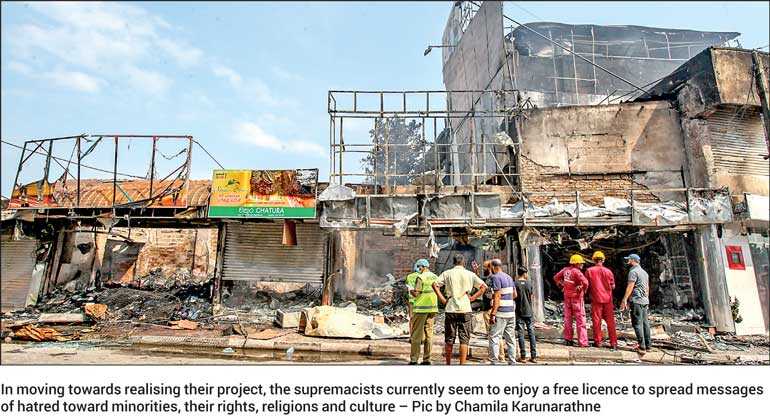Saturday Feb 14, 2026
Saturday Feb 14, 2026
Saturday, 28 September 2019 00:01 - - {{hitsCtrl.values.hits}}

 To the Buddhist Sinhalese in particular, the civil war victory in 2009 had a profound impact by overturning the hitherto menacing psychological fear of an invasion from the northern neighbour in support of local Tamils and partitioning the island, into a hope of achieving total dominance over Sri Lanka’s territory and polity. The rise of supremacist parties and pressure groups, such as, JHU, BBS, Ravana Balaya, Mahasohon Balakaya, Sinha Le, and so on, represent that hope and they are trying relentlessly to translate it into reality.
To the Buddhist Sinhalese in particular, the civil war victory in 2009 had a profound impact by overturning the hitherto menacing psychological fear of an invasion from the northern neighbour in support of local Tamils and partitioning the island, into a hope of achieving total dominance over Sri Lanka’s territory and polity. The rise of supremacist parties and pressure groups, such as, JHU, BBS, Ravana Balaya, Mahasohon Balakaya, Sinha Le, and so on, represent that hope and they are trying relentlessly to translate it into reality.
No Sinhalese politician who does not support this enterprise can even dream of leading the country. This is the crux of Sri Lankan politics at the moment. All other issues have become subsidiary. Buddhist supremacists, like their White, Hindutva and Islamist counterparts abroad are a hegemonic force disfavouring democratic pluralism. In consequence, Sri Lanka’s millennial history of exceptional acceptance of religious and ethnic minorities is in serious jeopardy.
Backed by elements from the Sangha, these supremacists demand and canvass for the retention and not abolition of the all-powerful executive presidency, and they are willing to support even a reborn Hitler, as Rev. Wenduruwe Upali Thera wished in June 2018, to take over that office and Buddhisise the country and its polity, wholesale. Ven. Rathna Thera’s concern that abolishing the executive presidency would ‘destabilise the country’ also underlines this desire; and Rev. Galagoda Atte Gnanasara’s address at the public rally in Kandy on 7 June unmistakably announced the supremacist agenda for Buddhist hegemony. The way the Sangha ostracised Minister Mangala Samaraweera, for daring to counter and negate the supremacists, indicates the growing influence of this dangerous group.
JVP is not talking about Buddhist rights or Hindu, Christian and Muslim rights, but rights of citizens within a democratic polity. So far it has kept away from identity politics played by other parties. Is there anything better for the minorities than this? With equality and justice for all, and honesty and accountability for rulers, Sri Lankan politics can turn over a new leaf under this people-powered movement
Even before 2009, the foundation for Buddhist hegemony was constitutionally cemented by the socialist Dr. Colvin R. de Silva in 1972. His Republican Constitution accorded ‘foremost place’ to Buddhism, while ‘assuring to all religions the rights granted by section 18 (1) d’. It was actually not the socialist Colvin, but Prime Minister Sirimavo Bandaranayake, who, mindful of Article 5 of the 1815 Kandyan Convention, and under pressure from Mahanayakas, imposed that provision. In Colvin’s words, ‘she was thrusting the Kandyan Throne into our constitution’.
Once introduced, no amendment or new constitution would dare revoking that clause, and accordingly, the 1978 Democratic Republican Constitution of JR reaffirmed the ‘foremost place’, while guaranteeing protection to all other religions under Article 9 of Chapter 2. Even the current Prime Minister, perhaps as a last ditch effort to arrest his dwindling popularity among Sinhalese Buddhists, has guaranteed Buddhism ‘paramount’ place with protection to other religions. It is that protection which is now under challenge from supremacists.
Political Buddhism
What they are demanding is for that ‘foremost place’ be extended and applied not simply to Buddhism, but to Sinhala Buddhists in every aspect of Sri Lankan polity. This is political Buddhism in its stark nakedness, which was ridiculed and condemned by several intellectuals and civic minded Buddhists, and among them were eminent scholar Buddhists like Ven. Walpola Rahula Thera and Ven. Maduluwawe Sobitha Thera in the past and Ven. Galkande Dhammnanada at present. Their voices of compassion and tolerance are getting drowned amidst howls of hatred and intolerance from supremacists. Political leaders with rare exceptions, and with eyes fixed on the Buddhist vote bank have lost their guts to challenge this menace.
In moving towards realising their project, the supremacists currently seem to enjoy a free licence to spread messages of hatred toward minorities, their rights, religions and culture. The post-2009 catalogue of violence unleashed against the Muslim community; instances of converting Hindu Holy premises into Buddhist Vihares; and illegal encroachment by supremacists-backed Buddhist colonists into lands hereditarily owned and occupied by minorities, all without even a murmur of disapproval either from the President or Prime Minister or Leader of the Opposition demonstrate how powerful and influential these supremacists have become.
A law unto themselves
In short, they have become a law unto themselves. How else could one explain their utter disregard to a court order preventing cremation of a dead body in the precincts of the Hindu Neeraviyadi Pillayar temple in Mullaitivu? What happened to law enforcement in this country? How will the Muslims, who have witnessed random incidents in recent times of pig heads thrown inside mosques, respond, if on a fine morning they were to discover a statue of Buddha planted in the premises of a mosque? The way these supremacists are behaving one cannot dismiss such a possibility. It is in this frightening and convulsive environment that the two minority communities are confronting a presidential election. What options do they have?
In 2005, in fear of LTTE’s deadly reprisals, Tamils surrendered to the call of its leader and boycotted the Presidential Election, which allowed Mahinda Rajapaksa to creep through. They paid the heaviest price ever for their stupidity, and, as a result, lost even the little they had by way of power, influence and dignity. 10 years later, in 2015, they and the Muslims caste a protest vote against the Rajapaksa regime and replaced it with great fanfare the ‘Yahapalana’ regime of the odd couple MS and RW.
Crisis after crisis incapacitated that regime, which soon busied itself in solving factional frictions, rather than governing the country and fulfilling the expectations of the minorities even partially. Muslims in particular suffered more under the current regime than under Rajapaksa’s. Tamils, led by the TNA, were simply duped. What alternative/s do these minorities have now?
(The writer is attached to the School of Business and Governance, Murdoch University, Western Australia.)
As long as the three major parties, UNP and SLPP and SLFP, remain even silently supportive of the supremacists’ agenda there is no hope for minorities to get redress for their grievances or justice and fairness in governance. Supported by some senior members from the Sangha, supremacists are increasing their power and influence over the Buddhist-Sinhala vote bank. To expect governments led by these parties, which are supremacist lenient, corrupt, and nepotistic, to deliver good governance is to ask for the impossible. The country therefore needs nothing short of a systemic change, and the only leader who is campaigning along that line is AKD of JVP. It is time the minorities consider seriously the case of this alternative.
In the meantime, opportunist leaders of Tamil and Muslim parties are once again talking about ‘conditional support’ to either UNP or SLPP. What happened to the conditional support extended so far? Voters should be aware that behind the so-called conditional support is not the concern about community welfare and national development but personal status and privileges of leaders. Do Tamils and Muslims want to be duped by these charlatans once more?
Throughout the political history of post-independence Sri Lanka, Tamils and Muslims, except for a few among them, continued to show almost a genetic aversion to parties that promised equality of treatment to all citizens irrespective of ethnic, linguistic or religious differences. While the Tamils continued to back their own reactionary leaders, Muslims, schooled in religious conservatism and dictated by business interests alternated their allegiance between UNP and SLFP. But, that was a time when Buddhist supremacists were not in the limelight. Today, they are a decisive force to reckon with, and the three major parties are understandably reluctant to distance themselves from this group.
Systemic reforms
JVP on the other hand realises that the country has to break away from this corrupt, ethno-religious prism by bringing in systemic reforms. Mainstream media, local and foreign business interests, and international managers of open economies are obviously not going to support AKD and are campaigning to sideline his party. This is why JVP is forced to depend totally on grass root support, and that will be its strength.
JVP is not talking about Buddhist rights or Hindu, Christian and Muslim rights, but rights of citizens within a democratic polity. So far it has kept away from identity politics played by other parties. Is there anything better for the minorities than this? With equality and justice for all, and honesty and accountability for rulers, Sri Lankan politics can turn over a new leaf under this people-powered movement.
In the meantime, opportunist leaders of Tamil and Muslim parties are once again talking about ‘conditional support’ to either UNP or SLPP. What happened to the conditional support extended so far? Voters should be aware that behind the so-called conditional support is not the concern about community welfare and national development but personal status and privileges of leaders. Do Tamils and Muslims want to be duped by these charlatans once more?
One of these politicians even floated the idea of nominating a Muslim to contest for presidency. This was the climax of his political stupidity and sure to drive his community to commit political suicide. Therefore, let the minority votes at the forthcoming contest be a protest vote against UNP, SLPP and SLFP, but in favour of JVP. If that happens this people-powered movement is destined to make a major impact on Sri Lankan politics if not immediately at least in the near future. If minorities wake up to this reality, they can create history and help saving the nation.